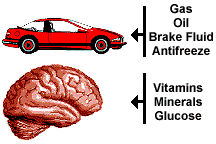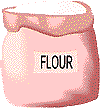 | Nutrition and the Brain |
 | Nutrition and the Brain |
|
Your brain is like a car. A car needs gasoline, oil, brake fluid and
other materials to run properly. Your brain also needs special materials
to run properly: glucose, vitamins, minerals and other essential
chemicals. For example, the fuel (energy) for your brain is glucose.
You can get glucose by eating carbohydrates or other foods that can be
converted to glucose. Your brain must manufacture the right proteins and fats to do things such as grow new connections or add myelin, the fatty sheath to axons. You do this by digesting proteins and fats in food and using the pieces, that is, the amino acids and fatty acids, to make the new brain proteins and fats. Without the correct amount and balance of particular building blocks, your brain will not work properly. Too little (deficiency) or too much (overabundance) of the necessary nutrient can affect the nervous system. (For a table that shows the effects of too little or too much of specific nutrients, please see Nutrient Effects on the Nervous System.) |  |
| Vocabulary | |
|
Amino Acid: building block of proteins;
an organic compound Protein: a large molecule made from amino acids. Examples of proteins are enzymes and hormones. Vitamin: substance from food that is necessary for the proper function of the body. Many vitamins assist in enzymatic processes. |
Essential Vitamin or Mineral:
vitamins and minerals that are needed by the body but are not produced
by the body. Therefore, these materials must be taken in as part of the
diet. Lipids (fats): not all fats are bad for you. In fact, some fats are essential for proper brain function. Two lipids important to the brain are the n-6 and n-3 fatty acids. Low levels of n-3 fatty acids in a diet can cause visual problems especially by affecting the retina. Studies in animals have shown that diets without n-3 fatty acids cause learning, motivation and motor problems and may affect systems that use the neurotransmitters dopamine and serotonin in the frontal cortex. The n-6 fatty acids are also important in proper brain function because they affect neurotransmitter release and they also influence the ability of neurons to use glucose.
 |
Diet and the NeurotransmittersCertain foods contain precursors (starting materials) for some neurotransmitters. If a diet is deficient in certain precursors, the brain will not be able to produce some neurotransmitters. Neurological and mental disorders may occur when the balance of neurotransmitters is upset. Examples of neurotransmitter precursors include:
|

|
The Journey Into the BrainNutrients must follow a tricky pathway to your brain and overcome several challenges:
The Blood Brain Barrier (BBB)The blood brain barrier (BBB) keeps many substances out of the brain, but it also must let nutrients into the brain. You might think of the BBB as a wall between the bloodstream and neurons. A substance must cross through this wall from the blood to reach neurons. The BBB can be crossed in three ways:
| 
|
Malnutrition and the Brain Vitamin and mineral deficiencies can be caused by:
Vitamin and mineral deficiencies can be caused by:
|
| The brain of a human fetus grows rapidly from the 10th to 18th
week of pregnancy, so it is important for the mother to eat nutritious
foods during this time. The brain also grows rapidly just before and for
about 2 years after birth. Malnutrition during these periods of rapid
brain growth may have devastating effects on the nervous system and can
affect not only neurons, but also glial cell
development and growth. Effects on glial cells may change myelin
development especially because myelin continues to form around axons for
several years after birth.
Some effects of malnutrition can be repaired by a proper diet, so not all of the effects of poor diets are permanent. Researchers believe that the timing of malnutrition is an important factor in determining if problems will occur. This means that missing out on a particular nutrient at the time when a part of the brain is growing and needs that nutrient will cause a specific problem there. |
Studying the Nutrition-Brain-Behavior ConnectionThe study of how nutrition affects the brain and behavior is relatively new. Scientists have just begun to understand how changes in particular nutrients alter the brain and how these neural changes then affect intelligence, mood, and the way people act. Experiments that investigate this nutrition-brain-behavior interaction, particularly those that study the effects of malnutrition, are difficult for several reasons:
|
| WARNING: Always consult with a health care professional
before starting a diet or nutritional supplement program, such as taking
high doses of vitamins or minerals. Small changes in diet can have large
effects on your health.
|
| For more information on
nutrition and
the brain, see:
|
| References:
|
| BACK TO: | Neurological and Mental Disorders | Exploring the Nervous System | Table of Contents |
![[email]](./gif/menue.gif) Send E-mail |
 Get Newsletter |
 Search Pages |
 Donate to Neuroscience for Kids |